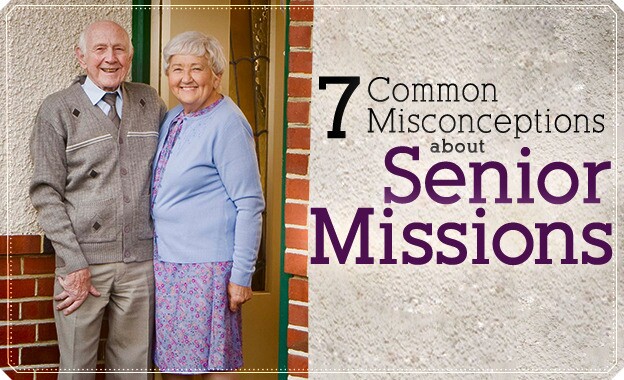
There is a great need for more senior missionaries, but a few myths about serving have kept some senior members from signing up. Learn the truth behind what it takes to be a senior missionary:
Misconception #1: You have to be married to serve a senior mission. While many senior missionaries do serve as couples, there are also opportunities available for single senior sisters to serve. You can review the Senior Missionary Opportunities Bulletin for a list of current openings at www.lds.org/senioropportunities. This list is updated weekly.
Misconception #2: Senior missionaries are too old to learn a foreign language. It is never too late in life to keep learning, and by being willing to serve in a foreign language area, seniors open up possibilities that they may never have imagined. While some older missionaries may not become as fluent as the young missionaries, anyone can learn to communicate on a simple level. Sometimes, a weakness in speaking even invites the Spirit and the sympathy of the local people. There are vast areas of the world that need the service of senior missionaries. The Lord can use us and in spite of our limitations, and we will be an influence for good. Don’t forget the gifts of the Spirit which include the gift of tongues; missionaries are blessed to learn languages, including older missionaries!
Misconception #3: Senior missionaries have to have extraordinary health to serve a senior mission. This isn’t true at all! There are opportunities for nearly everyone who desires to serve. My father was a type I diabetic and he served a mission in Samoa 20 years ago at the age of 75. Many senior missionaries have health challenges but there is always a way to overcome or accommodate their needs. Senior missionaries don’t have to work as hard physically as the young missionaries do; they can even nap if they need to!
Misconception #4: Senior couples can’t serve if they have a dependent child. Accommodations can be made for senior couples who are also caretakers. My parents served an education mission in Samoa along with my handicapped sister, who served in the Church College library while they taught regular classes. Another sister, Rebecca, served a family history mission in Salt Lake City, along with her handicapped son. He served in the cafeteria and was her companion. Every situation is different, but opportunities can be found for every circumstance.
Misconception #5: Senior missionaries need to have special skills and talents to serve a senior mission. Simple things like having raised a family, knowing how to sing the hymns, or your experiences in various church callings are valuable in many areas of the world where the Church is new or where membership requires learning a whole new culture. Marriage, for example, is not common in Cape Verde. Just setting an example of a long married couple is valuable there. In another instance, we knew a pair of widowed sisters from Southern Utah who served as companions in an inner-city ward in Kansas. They baked whole wheat bread every morning and then delivered the fresh warm bread to less-active members in their area. No one could resist the bread or the sweet sisters who brought a message of love and an invitation to return to church.
Misconception #6: Senior missionaries need to have a lot of money saved to serve a mission. Some mission service opportunities allow senior missionaries to serve from their current home, and many missions served away from home are actually less expensive than living at home. Some senior missionaries rent their home out while they’re serving, and even make money while serving. The Church is very careful to send missionaries where their personal resources, both financial and physical, won’t be unduly stressed.
Misconception #7: Skype and FaceTime are the same as being there. While Skype, FaceTime, and other programs can help you stay connected with your family, you will still miss your children and grandchildren. Internet contact is not a great substitute for sharing family times, but that is part of the sacrifice which will bring us amazing blessings for serving. A mission is not easy, but nothing good is! While serving, we learn and grow and our families will know of the depth of our testimony in a way that can never be ignored.
To learn more about senior missions, including how to prepare no matter where you are in life, check out our feature, “How to Prepare for a Senior Mission.”
Sister Diana Demke is currently serving in the Cape Verde, Praia Mission.

